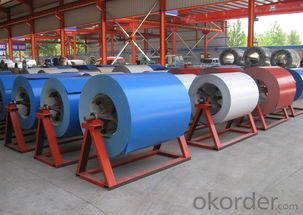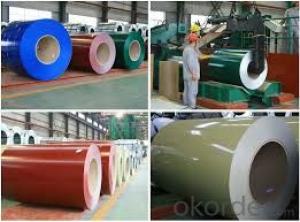Prepainted Galvanized Steel with Zinc Coated/Cold Steel Rolled
- Loading Port:
- Shanghai
- Payment Terms:
- TT OR LC
- Min Order Qty:
- 20 m.t.
- Supply Capability:
- 10000 m.t./month
OKorder Service Pledge
OKorder Financial Service
You Might Also Like
Product Description
Color Coated Galvanzied Steel
1, Grade: SGCC, PPGI CGCC, SGLCC
2, Width: 800-1250mm
3, Thickness: 0.3-1.0mm
4, Color: ALL RAL
* Base Material: Al-Zn Galvanized Steel Coil. SGLCC
* Top side: 15-25 microns primer microns polyester.
* Back side: 5-8 microns primer epoxy.
* Width: 800-1, 250mm
* Thickness: 0.3 -1.0mm Thickness tolerance: +/- 0.02mm
* Al-Zn coating: 30-150g /sq. M. Or can be provided as clients' requirements
* Color: All RAL colour is available or customer supplying the sample
* Inner diameter of coil: 508mm&610mm.
* Packing: Standard seaworthy packing or according to user's need.
* Weight of each coil: 9 tons max
* Guarantee/ warranty

Usage
1. Used as roof panel, wall panel in steel structure in warehouse, factories, exibition hall container houses, cold storage,
2. It is also mainly used in light industry, automobile, construction, animal husbandry, fishery and commerce, etc.
Packing
1. Metal band strapping
2. Outside diameter ring
3. Label
4. Protective steel sheet
5. Water and rustproof paper
6. Steel sheet
Q&A Do you accept OA payment terms?
ANSWER: Yes, sure, but it normally depending on the order value
- Q:Can steel coils be used in the production of automotive parts?
- Yes, steel coils can be used in the production of automotive parts. Steel coils are commonly used in the manufacturing of various automotive components such as body panels, chassis parts, springs, and engine components due to their strength, durability, and formability. The coils are processed and shaped into the desired automotive parts using various techniques such as cutting, stamping, welding, and forming.
- Q:How are steel coils used in the production of steel framing systems?
- Steel coils are used in the production of steel framing systems as they are unrolled and fed into a machine that shapes and cuts the steel into the desired lengths and profiles. These coils provide a continuous supply of high-quality steel, allowing for efficient and precise manufacturing of steel framing components, which are then assembled to create sturdy and durable steel structures.
- Q:What are the different steel coil packaging methods?
- There are several different steel coil packaging methods, including using steel strapping or banding to secure the coils, using plastic or metal end caps to protect the edges of the coils, and using wooden or steel pallets to stack and transport the coils. Additionally, some steel coils may be wrapped in protective film or paper to prevent damage during shipping and storage.
- Q:Iron too heavy for Ulysses but if there was any iron used id imagine it was steel. Can steel go deeper into sun than iron? Compare two bolts.. 1steel 1iron..is there a difference to what the steel can do?
- Steel is usually stronger than iron. But steel is, by definition, an alloy of iron and one or more other materials. There are thousands of different steel alloys. Be more specific.
- Q:which cost more: ALLOY, GUNMENTAL OR STAINLESS STEEL. GIVE ME AN IDEA OF THE COST OF EACH.
- Alloy okorder /
- Q:What are the common size limitations for steel coil production?
- The size limitations for steel coil production can vary based on various factors, including the type of steel used, the manufacturing process, and the available equipment. However, there are generally accepted size limitations in the industry. One primary constraint is the width of the steel coil, which is typically determined by the size of the rolling mill or slitting equipment used in production. Standard widths for steel coil production range from approximately 600 millimeters (23.6 inches) to 2,000 millimeters (78.7 inches). Nonetheless, specialized equipment and processes can achieve widths outside of this range. Another limitation is the thickness of the steel coil, which can be influenced by the type of steel, intended application, and manufacturing capabilities. Common thicknesses for steel coils range from 0.15 millimeters (0.006 inches) to 6 millimeters (0.236 inches). However, specialized equipment and processes may be required to produce thicker or thinner coils. The weight of the steel coil is also an important consideration, typically determined by the capacity of production and handling equipment, as well as transportation limitations. Standard coil weights range from a few hundred kilograms to several tons. However, larger equipment or dividing the coil into smaller coils can enable the production of coils that exceed these limits. In addition to width, thickness, and weight, there may also be limitations on the length of the steel coil. This can be influenced by factors such as the size of the production line, handling and transportation capabilities, and customer requirements. Standard coil lengths typically range from a few meters to several tens of meters. However, specialized equipment and processes can produce longer coils. It is important to note that these size limitations are not fixed and can vary depending on project or customer requirements. Manufacturers often collaborate closely with customers to determine the optimal size limitations for their steel coil production, ensuring the final product meets desired specifications.
- Q:Also, what is the top best slow cooker that is 100% stainless steel? Thank you!
- My SS pans are Prestige.
- Q:Can steel coils be used in marine environments?
- Although steel coils can be utilized in marine environments, it is crucial to take necessary precautions to avoid corrosion. Given that steel is susceptible to corrosion when exposed to moisture and saltwater, which are commonly found in marine environments, it is imperative to employ protective measures on the steel coils. One such method is treating them with protective coatings like galvanization or painting to establish a shield between the steel and the corrosive elements. Moreover, regular maintenance and inspections should be conducted to detect any signs of corrosion and promptly address them to prevent further harm. By implementing these measures, steel coils can be effectively employed in marine environments while minimizing the risk of corrosion and ensuring their durability and performance.
- Q:What are the different types of steel coil cutting tools?
- There are several different types of steel coil cutting tools available in the market. These tools are specifically designed to cut steel coils efficiently and accurately. Some of the common types of steel coil cutting tools are: 1. Slitting shears: Slitting shears are widely used for cutting steel coils into narrow strips. These shears have multiple blades that make clean and precise cuts without causing any damage to the material. They are typically used for high-volume production and can handle various thicknesses of steel coils. 2. Rotary shears: Rotary shears are another type of cutting tool commonly used for cutting steel coils. They consist of rotating blades that shear through the material as it passes through. Rotary shears are ideal for cutting medium to thick steel coils and are known for their high cutting speed and accuracy. 3. Guillotine shears: Guillotine shears are heavy-duty cutting tools that can handle thick steel coils. They work by using a downward force to cut through the material with a single clean stroke. Guillotine shears are known for their power and precision, making them suitable for cutting large volumes of steel coils. 4. Laser cutting machines: Laser cutting machines are advanced cutting tools that use a high-powered laser beam to cut through steel coils. They offer precise and intricate cuts with minimal heat distortion. Laser cutting machines are ideal for cutting complex shapes and patterns on steel coils. 5. Water jet cutting machines: Water jet cutting machines use a high-pressure stream of water mixed with abrasive particles to cut through steel coils. This method is highly accurate and does not generate heat, making it suitable for cutting heat-sensitive materials. Water jet cutting machines can cut through various thicknesses of steel coils and produce smooth edges. Each type of steel coil cutting tool has its own advantages and is suitable for different applications. The choice of tool depends on factors such as the thickness of the steel coil, required precision, production volume, and budget.
- Q:How do steel coils contribute to the water and wastewater industry?
- Steel coils are an essential component in the water and wastewater industry as they play a crucial role in the construction and maintenance of infrastructure. These coils are made from high-quality steel, which offers numerous advantages for the industry. Firstly, steel coils are used in the manufacturing of pipes and tubes that are primarily used for transporting water and wastewater. Steel pipes are known for their exceptional strength and durability, allowing them to withstand high pressure and heavy loads. This makes them ideal for water distribution systems, sewage networks, and treatment plants. Steel coils provide the necessary material for the production of these pipes, ensuring a reliable and long-lasting infrastructure. Moreover, steel coils are also utilized in the construction of storage tanks and reservoirs. These tanks are essential for water treatment plants, where they store large volumes of water or wastewater during the treatment process. Steel coils provide the necessary material for the fabrication of these tanks, ensuring their structural integrity and preventing leaks or contamination. Additionally, steel coils are used in the manufacturing of various equipment and components used in the water and wastewater industry. For instance, steel coils are utilized in the production of pumps, valves, and control systems, which are crucial for the efficient operation of water treatment plants, pumping stations, and sewage networks. Steel's strength and corrosion resistance make it an ideal material for these applications, ensuring reliable and long-lasting equipment. Furthermore, steel coils are also employed in the construction of wastewater treatment plants and facilities. These plants employ various processes to remove contaminants from wastewater before it is discharged into the environment. Steel coils provide the necessary material for the construction of these facilities, including structural supports, tanks, and other components. The durability and resilience of steel ensure the longevity and efficiency of these treatment plants. In summary, steel coils are integral to the water and wastewater industry due to their contribution to the construction and maintenance of critical infrastructure. They are used in the manufacturing of pipes, tanks, equipment, and facilities, ensuring the strength, reliability, and durability necessary for the efficient operation of water and wastewater systems.
1. Manufacturer Overview |
|
|---|---|
| Location | |
| Year Established | |
| Annual Output Value | |
| Main Markets | |
| Company Certifications | |
2. Manufacturer Certificates |
|
|---|---|
| a) Certification Name | |
| Range | |
| Reference | |
| Validity Period | |
3. Manufacturer Capability |
|
|---|---|
| a)Trade Capacity | |
| Nearest Port | |
| Export Percentage | |
| No.of Employees in Trade Department | |
| Language Spoken: | |
| b)Factory Information | |
| Factory Size: | |
| No. of Production Lines | |
| Contract Manufacturing | |
| Product Price Range | |
Send your message to us
Prepainted Galvanized Steel with Zinc Coated/Cold Steel Rolled
- Loading Port:
- Shanghai
- Payment Terms:
- TT OR LC
- Min Order Qty:
- 20 m.t.
- Supply Capability:
- 10000 m.t./month
OKorder Service Pledge
OKorder Financial Service
Similar products
New products
Hot products
Related keywords




























